| Listing 1 - 10 of 17 | << page >> |
Sort by
|
Book
Year: 1986 Publisher: Cambridge, Massachusetts : MIT Press,
Abstract | Keywords | Export | Availability | Bookmark
 Loading...
Loading...Choose an application
- Reference Manager
- EndNote
- RefWorks (Direct export to RefWorks)
What makes people smarter than computers? These volumes by a pioneering neurocomputing group suggest that the answer lies in the massively parallel architecture of the human mind. They describe a new theory of cognition called connectionism that is challenging the idea of symbolic computation that has traditionally been at the center of debate in theoretical discussions about the mind. The authors' theory assumes the mind is composed of a great number of elementary units connected in a neural network. Mental processes are interactions between these units which excite and inhibit each other in parallel rather than sequential operations. In this context, knowledge can no longer be thought of as stored in localized structures; instead, it consists of the connections between pairs of units that are distributed throughout the network. Volume 1 lays the foundations of this exciting theory of parallel distributed processing, while Volume 2 applies it to a number of specific issues in cognitive science and neuroscience, with chapters describing models of aspects of perception, memory, language, and thought.
Book
Year: 1986 Publisher: Cambridge, Massachusetts : The Massachusetts Institute of Technology Press,
Abstract | Keywords | Export | Availability | Bookmark
 Loading...
Loading...Choose an application
- Reference Manager
- EndNote
- RefWorks (Direct export to RefWorks)
What makes people smarter than computers? These volumes by a pioneering neurocomputing group suggest that the answer lies in the massively parallel architecture of the human mind. They describe a new theory of cognition called connectionism that is challenging the idea of symbolic computation that has traditionally been at the center of debate in theoretical discussions about the mind. The authors' theory assumes the mind is composed of a great number of elementary units connected in a neural network. Mental processes are interactions between these units which excite and inhibit each other in parallel rather than sequential operations. In this context, knowledge can no longer be thought of as stored in localized structures; instead, it consists of the connections between pairs of units that are distributed throughout the network. Volume 1 lays the foundations of this exciting theory of parallel distributed processing, while Volume 2 applies it to a number of specific issues in cognitive science and neuroscience, with chapters describing models of aspects of perception, memory, language, and thought.
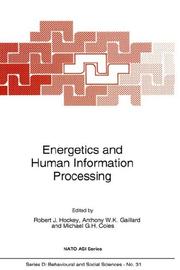
ISBN: 9024733812 9401084793 9400944489 Year: 1986 Volume: vol 31 Publisher: Dordrecht : Nijhoff,
Abstract | Keywords | Export | Availability | Bookmark
 Loading...
Loading...Choose an application
- Reference Manager
- EndNote
- RefWorks (Direct export to RefWorks)
Bioenergetics --- Human information processing --- Congresses. --- Physiological aspects
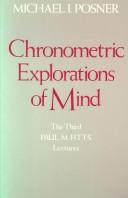
ISBN: 0195039998 Year: 1986 Publisher: New York (N.Y.) : Oxford university press,
Abstract | Keywords | Export | Availability | Bookmark
 Loading...
Loading...Choose an application
- Reference Manager
- EndNote
- RefWorks (Direct export to RefWorks)
Cognition. --- Higher nervous activity. --- Human information processing.
Book
Year: 1986 Publisher: Cambridge, Mass. : MIT Press,
Abstract | Keywords | Export | Availability | Bookmark
 Loading...
Loading...Choose an application
- Reference Manager
- EndNote
- RefWorks (Direct export to RefWorks)
Learning, Psychology of. --- Learning --- Human information processing --- Mathematical models. --- Mathematical models.
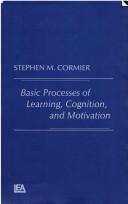
ISBN: 0898596890 Year: 1986 Publisher: Hillsdale Erlbaum
Abstract | Keywords | Export | Availability | Bookmark
 Loading...
Loading...Choose an application
- Reference Manager
- EndNote
- RefWorks (Direct export to RefWorks)
Cognition --- Human information processing --- Learning, Psychology of --- Mammals --- Motivation (Psychology) --- Neuropsychology --- Brain --- Cognition --- Learning --- Behavior --- physiology --- physiology --- physiology
Book
ISBN: 0521332591 9780521332590 Year: 1986 Volume: vol *4
Abstract | Keywords | Export | Availability | Bookmark
 Loading...
Loading...Choose an application
- Reference Manager
- EndNote
- RefWorks (Direct export to RefWorks)
681.3*H12 --- User/machine systems: human factors; human information processing --- 681.3*H12 User/machine systems: human factors; human information processing --- Elektronische rekenmachines. Ontwerp en bouw. (Congres) --- Systèmes d'ordinateur interactifs. Ergonomie. (Congrès) --- Calculatrices électroniques. Projet et construction. (Congrès) --- Interactieve computersystemen. Ergonomie. (Congres)
Book
ISBN: 2870371446 9782870371442 Year: 1986 Volume: 11 Publisher: Namur Presses universitaires de Namur
Abstract | Keywords | Export | Availability | Bookmark
 Loading...
Loading...Choose an application
- Reference Manager
- EndNote
- RefWorks (Direct export to RefWorks)
Colloques --- Colloquia --- Informatica --- Informatique --- 007.5 --- informatica - cybernetica - Internet - Sociale media (zie ook 681.3) --- Beroepskwalificaties 331.543 --- 681.3*H12 --- 681.3*K4 --- User/machine systems: human factors; human information processing --- Computerwetenschap--?*K4 --- 681.3*H12 User/machine systems: human factors; human information processing
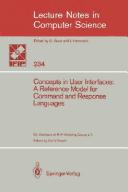
ISBN: 3540167919 0387167919 3540448403 Year: 1986 Volume: vol 234 Publisher: Berlin : Springer-Verlag,
Abstract | Keywords | Export | Availability | Bookmark
 Loading...
Loading...Choose an application
- Reference Manager
- EndNote
- RefWorks (Direct export to RefWorks)
Artificial intelligence. Robotics. Simulation. Graphics --- Computer architecture. Operating systems --- 681.3*H12 --- User/machine systems: human factors; human information processing --- 681.3*H12 User/machine systems: human factors; human information processing --- Logic design. --- Operating systems (Computers). --- Computer system performance. --- Logic Design. --- Operating Systems. --- System Performance and Evaluation. --- Computer operating systems --- Computers --- Disk operating systems --- Systems software --- Design, Logic --- Design of logic systems --- Digital electronics --- Electronic circuit design --- Logic circuits --- Machine theory --- Switching theory --- Operating systems
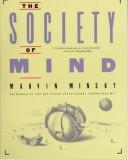
ISBN: 0671657135 0671607405 9780671607401 9780671657130 Year: 1986 Publisher: New York, NY : Simon & Schuster Macmillan,
Abstract | Keywords | Export | Availability | Bookmark
 Loading...
Loading...Choose an application
- Reference Manager
- EndNote
- RefWorks (Direct export to RefWorks)
Human information processing --- Intellect --- Science --- Information, Traitement de l', chez l'homme --- Intelligence --- Sciences --- Philosophy --- Philosophie --- Cognition --- Psychology --- Memory --- Emotions --- Lerarenopleiding --- Intellect. --- Human information processing. --- Intelligence. --- Mental Processes --- Brain --- Models, Psychological. --- algemeen --- Philosophy. --- physiology. --- algemeen. --- -681.3*I20 --- Human intelligence --- Artificial intelligence (AI) in general; cognitive simulation; philosophical foundations --- 681.3*I20 Artificial intelligence (AI) in general; cognitive simulation; philosophical foundations --- Cognitive psychology --- Psychologie cognitive --- Science - Philosophy --- Developpement et capacites de la psyche
| Listing 1 - 10 of 17 | << page >> |
Sort by
|

 Search
Search Feedback
Feedback About UniCat
About UniCat  Help
Help News
News